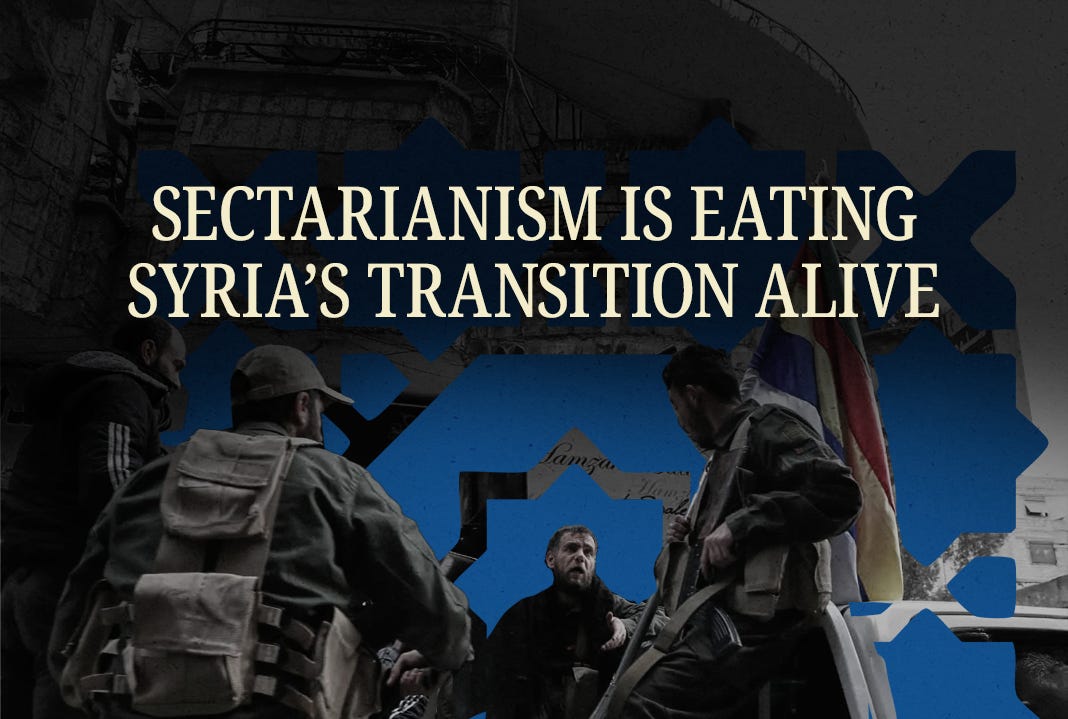Sectarianism Is Eating Syria’s Transition Alive
If Syria’s leaders can't learn from the past, they will doom the future they claim to be building
The Syrian transition was never going to be easy. But its success depends on one thing above all: a decisive break from the heavy-handed sectarianism of the past in favor of inclusion, patience, and local trust-building. Instead, the new authorities in Damascus are stumbling into the same traps that destroyed the old regime—centralization, paranoia, and, yes, sectarianism. Nowhere is this failure more glaring than in Suwayda, where a ham-fisted military intervention has ignited a powder keg of sectarian tension, invited foreign interference, and put the entire transition at risk. What was billed as a routine stabilization effort has turned into a case study in how not to govern a post-Assad Syria.
The plan was simple: government troops would move into Suwayda to reassert control and prevent further clashes between the Druze community and Bedouin tribes, then hand day-to-day security to pro-government Druze militias. That should have been the end of it. But sectarianism made zombies of us all. The result? Widespread violations, Israeli airstrikes, and hundreds dead.
Sending government troops into Suwayda was a strategic blunder. The clashes between Druze militias and Bedouin tribes were local disputes that could have been resolved through mediation without tanks and troop deployments. This was not an anti-government rebellion like the one in the coastal region in March. There was no need to treat it as an existential threat.
Even the Druze demand for autonomy, much like the Kurdish demand in the northeast, posed no immediate danger to the transitional authorities in Damascus. Neither group harbored expansionist ambitions. What was needed was patience: establish direct communication channels, hold regular meetings, mediate local disputes. This would have bought time to build trust and credibility, especially since national talks on Syria’s future constitution and system of governance have yet to begin.
Instead, the push to impose centralized control now—when sectarian tensions are already at a boiling point—was guaranteed to spark violence. Worse still, enforcement relied on Sunni fighters steeped in sectarian jihadist ideology. Not that the Druze militias led by Sheikh Hikmat al-Hajri were any less sectarian. But that is exactly the problem: a confrontation framed and fueled by mutual bigotry.
This miscalculation has already cost the transitional government dearly. It has undermined the credibility of its own Druze allies and greenlit a more aggressive Israeli intervention. Tel Aviv’s strikes, justified as protecting the Druze minority, have shattered the fragile prospects for a Syrian-Israeli peace deal—a development cheered by both Iran and Assad loyalists. The entire transition project is now wobbling on a precipice.
Meanwhile, the Kurdish-led Syrian Democratic Forces (SDF) are watching closely. Every Druze home burned, every sectarian slur uttered, hardens their conviction that the Islamist-dominated transitional government cannot guarantee their rights or enforce discipline. Expect them to dig in deeper, entrench their autonomy, and resist any attempt by Damascus to rein them in.
Where things go from here is anyone’s guess, especially with Israel now in the mix. But if the transitional government survives this crisis, it cannot return to business as usual. It must form a Transition Advisory Council—a body of experts from across Syria’s diverse communities—to craft a governance strategy grounded in de-escalation, decentralization, and inclusion. That is the bare minimum. Anything less, and Syria’s “transition” will collapse under the same sectarian fault lines that destroyed the previous regime.
This responsibility falls squarely on President Ahmad al-Sharaa’s shoulders. His record on regional and international outreach is commendable, thanks in part to his alliances with Saudi Arabia, Turkey, and Qatar. But managing Syria’s internal communal dynamics remains his greatest blind spot—perhaps due to restraints imposed by his ideological instincts and his overreliance on a narrow circle of Hay’at Tahrir Al-Sham (HTS) loyalists.
He must break out of that bubble to see the bigger picture and accept that success now depends on building partnerships with movements and individuals who do not share his worldview. Without that shift, all his diplomatic victories abroad will be overshadowed by failure at home—and by a transition that ends in renewed fragmentation.
Bottom line: The crisis underway in Suwayda is not an isolated event. It is a warning: a mirror reflecting the dangers of repeating the past under the banner of a new beginning. Ignore it, and Syria’s transition will end the way all false starts do—in blood and chaos. And Syrians will once again pay the price for their leaders’ mistakes.
Middle East Uncovered is powered by Ideas Beyond Borders. The views expressed in Middle East Uncovered are those of the authors and do not necessarily reflect the views of Ideas Beyond Borders.




